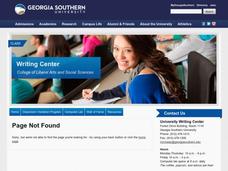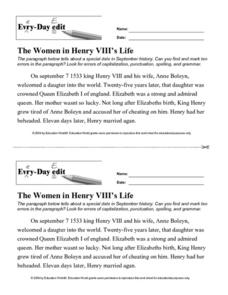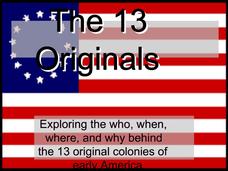Curated OER
We The People: A History
Students play a game about taxation where they have tax collectors that simulate the feelings and reasons that led to the American Revolution. In this taxation lesson plan, students learn about why the people in the colonies were so...
Curated OER
The Declaration of Independence
Students identify and examine the Declaration of Independence and ascertain its true intent and its eventual realization. Then they analyze the Declaration of Independence and summarize the intentions of the Declaration. Students also...
Curated OER
Homonyms Worksheet 1
In this grammar worksheet, students underline the appropriate word in parentheses that best fits twenty-one sentences. Students check to make sure each sentence is grammatically correct.
Curated OER
Fourth Grade Social Studies
In this social studies instructional activity, 4th graders answer multiple choice questions about wars, congress, colonies, and more. Students complete 25 questions.
Curated OER
Past Lives from The Troy Game
Ten multiple choice questions test readers' understanding of basic plot developments in Sara Douglass' historical fantasies Hades' Daughter and God's Concubine, the first two books in a four-part series.
Curated OER
Reasons for Settling the New World
After studying the reasons settlers entered the New World, primary learners try to persuade others to enter this new land. Class members present their arguments in a variety of ways including posters, writings, and charts. Richly...
Curated OER
The Hundred Years' War (1347-1453)
Detailing the causes, strategies, and effects of the Hundred Years' War, this presentation will interest even the most reluctant historians in your class. Bright pictures and maps help to put the war into context and allow teachers to...
K12 Reader
An Independent Nation
If your kids are curious about the American Revolution, help them understand more about its background with a reading passage and comprehension questions. Kids use context clues to answer each question, some of which require more...
Education World
Every Day Edit - William Penn
Who was William Penn? Learn about him while correcting grammatical mistakes in a short paragraph. There are errors in capitalization, punctuation, spelling, and grammar.
Education World
Every Day Edit - The Women in Henry VIII's Life
In this everyday editing activity, students correct grammatical mistakes in a short paragraph about the women in Henry VIII's life. The errors range in capitalization, punctuation, grammar, and spelling.
K12 Reader
The Magna Carta
A passage about the Magna Carta provides readers with an opportunity to demonstrate their ability to identify the main idea and supporting ideas in an article.
Curated OER
Pilgrims and Puritans
With graphic organizers galore, learners will follow the changes of church and state in early colonial America. They look at the differences between the pilgrims and the puritans in terms of beliefs and life ways. Myths and...
Curated OER
America Established Because of Protest
Students explore events and causes that led to American Revolution and examine popular pro-Patriot renderings and texts of these issues created both at that time and in later years. Students then prepare and deliver oral presentations...
Curated OER
Gulliver's Travels Discussion Questions
Good discussion questions are hard to find and even harder to craft. If you're looking for questions that will stimulate in-depth discussions for all four books in of Jonathan Swift's Gulliver's Travels, check out this resource.
Curated OER
The 13 Originals: Exploring the Who, When, Where, and Why Behind the 13 Original Colonies of Early America
Discover the stories behind each of the thirteen stripes on the American flag with this straightforward presentation. Complete with learning objectives, discussion questions, and solid information about each of the original thirteen...
Curated OER
Why Do Governments Exist? Locke, Hobbes, Montesquieu, and Rousseau
Here is a great secondary source reading that includes the primary ideas and philosophies of the famed Enlightenment philosophers: Thomas Hobbes, John Locke, Charles Montesquieu, and Jean-Jacques Rousseau. In additional to discussing...
K12 Reader
Understanding the Context: The Mayflower Compact
Scholars obtain a brief background of the Mayflower Compact, read its contents, and answer two questions that look at the passage's context to enhance reading comprehension.
Read Works
Plymouth Colony
Read about the tumultuous beginning to the United States with an informational text passage about Colonial America. As young researchers peruse an article about the arrival of the Mayflower, the settlers' relationship to the neighboring...
Constitutional Rights Foundation
Puritan Massachusetts: Theocracy or Democracy?
Was Puritan society governed as more of a theocracy or democracy? After comparing and contrasting a series of primary source documents, middle and high schoolers form small groups and debate the question.
Curated OER
Ye Olde English Sayings
Discover the historical roots of modern English with your young learners, and then discover the meaning of many old English sayings. What a great chance to explore the history behind many of the words and phrases we use today!
Curated OER
The Revolutions of 1848
1848 was a hot year for Europe, which endured political tumult and upheaval after years of tension buildup. This presentation details the circumstances surrounding revolutions in France, Austria-Hungary, Romania, Italy, Prussia, and...
Gilder Lehrman Institute of American History
Document Analysis: The Mayflower Compact
Here's a great comprehension worksheet that models for young readers how to focus on short sections of a complicated text and then to create a summary of the entire document based on their understanding of the sections.
Prestwick House
Hamlet
Who speaks the first line of Shakespeare's Hamlet? Who is the last character to die in the tragedy? Whose death drives Ophelia mad? Readers' knowledge of the play is tested by 24 such clues in a crossword puzzle.
Curated OER
Blasphemy! Salman Rushdie and Freedom of Expression
Students explore the concepts of blasphemy, censorship and freedom of expression through the lens of Salman Rushdie. They also consider how these issues have been reflected in US history.

























